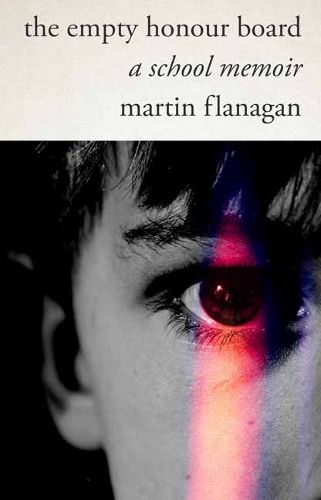Readings Newsletter
Become a Readings Member to make your shopping experience even easier.
Sign in or sign up for free!
You’re not far away from qualifying for FREE standard shipping within Australia
You’ve qualified for FREE standard shipping within Australia
The cart is loading…






In 1966, at the age of 10, Martin Flanagan was sent to a Catholic boarding school in north-west Tasmania. Of the 12 priests on the staff, three have since gone to prison for sexual crimes committed against boys in their care. In 2018 and 2019, a series of disclosures about the school appeared on the ABC Tasmania website. Then came the Pell case. What followed was a frenzy of opinions, none of which represented Flanagan's view.
The Empty Honour Board is part memoir, a reflection on truth and memory, and what is lost in rushing to judgement.
Flanagan's school abounds in memorable characters. There's a kid who escapes and gets as far as Surfers Paradise, and two boys who hold a competition during evening chapel to see who can confess more times. A wild boy receives a 'Bradmanesque' 234 strokes of the cane in one year.
It is a lonely and, at times, scary existence - as while the boys are victims of violence, they are also perpetrators. Drawn to neither the school nor its religion, Flanagan discovers himself through sport, later becoming known as one of Australia's most creative sportswriters.
But his boarding days linger. In his first three years at the school, he'd faced a series of adult moral challenges. Not being an adult, he had failed - in his own estimation. This becomes of great consequence in his 20s when his wife is about to have their first child. A major reckoning with his past, however, leaves him with his ambition as a writer.
A prison diary, a story of brotherly love, a journey of redemption, Flanagan's book goes inside an experience many have had, but few have talked about.
$9.00 standard shipping within Australia
FREE standard shipping within Australia for orders over $100.00
Express & International shipping calculated at checkout
In 1966, at the age of 10, Martin Flanagan was sent to a Catholic boarding school in north-west Tasmania. Of the 12 priests on the staff, three have since gone to prison for sexual crimes committed against boys in their care. In 2018 and 2019, a series of disclosures about the school appeared on the ABC Tasmania website. Then came the Pell case. What followed was a frenzy of opinions, none of which represented Flanagan's view.
The Empty Honour Board is part memoir, a reflection on truth and memory, and what is lost in rushing to judgement.
Flanagan's school abounds in memorable characters. There's a kid who escapes and gets as far as Surfers Paradise, and two boys who hold a competition during evening chapel to see who can confess more times. A wild boy receives a 'Bradmanesque' 234 strokes of the cane in one year.
It is a lonely and, at times, scary existence - as while the boys are victims of violence, they are also perpetrators. Drawn to neither the school nor its religion, Flanagan discovers himself through sport, later becoming known as one of Australia's most creative sportswriters.
But his boarding days linger. In his first three years at the school, he'd faced a series of adult moral challenges. Not being an adult, he had failed - in his own estimation. This becomes of great consequence in his 20s when his wife is about to have their first child. A major reckoning with his past, however, leaves him with his ambition as a writer.
A prison diary, a story of brotherly love, a journey of redemption, Flanagan's book goes inside an experience many have had, but few have talked about.
Martin Flanagan’s new book, The Empty Honour Board: A School Memoir is a raw and graphic account of his time at a religious boarding school in an unnamed Tasmanian town in the late 1960s.
Clearly a defining moment in his life, in this book he looks back on those years and the actions of the priests. But he also considers the actions of his fellow students, and indeed his own culpability and moral responsibility, as bullying, corporal punishment and sexual assaults were all rife.
Flanagan is known as one of Australia’s finest sports writers, particularly on Australian Rules Football. He’s also known for his writing on matters relating to Indigenous affairs. This new book is obviously very personal, and it’s one he was warned against writing. Indeed, ‘I was warned against writing this,’ is the first line in the introduction of the book. It is later followed by, ‘You don’t want to go stirring up that shit again.’
I didn’t attend boarding school, but I did attend an all-boys Christian Brothers school, and I must say some of the stories here brought back memories of my time at school in the 1980s. Certainly, there was some violence from the Brothers, although I am sure nothing like what Flanagan and others experienced. Also, at my school there were many stories of the Brothers acting inappropriately towards the students. Indeed, some of the teachers from my school have gone to prison for their assaults. Another familiar story is the way the Catholic Church knowingly moved perpetrators to a new school or parish, as if doing so absolved them of their crimes.
Flanagan writes unflinchingly about what he and others experienced. It is not an easy read, but very powerful in its examination of abuse perpetrated by institutions upon the very people they should be looking after.
See what the Readings’ team have to say on the blog, discover related events and podcast episodes.
Get rare insight into the lives of well-known figures with the latest biography and memoir.
See a new side of athletes and politicians, discover fascinating figures from Australia’s history or start to understand contemporary Australia better, with these new biographies and memoirs from local authors.